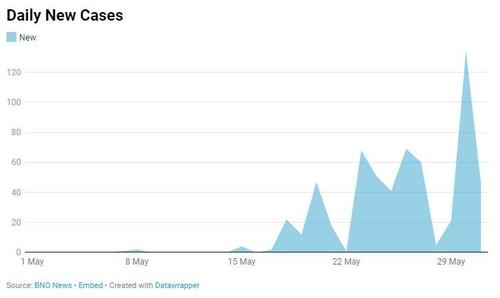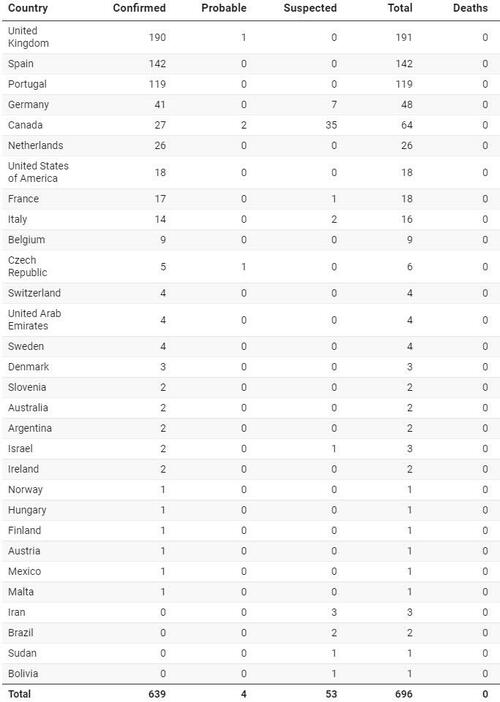
The monkeypox virus has sprung up in countries around the world, including in places where the virus does not usually exist.
While there are several disease outbreaks of similar size at the moment, for example hemorrhagic fever in Iraq or the bubonic plague in the Democratic Republic of the Congo, monkeypox has caught the media and the public’s attention, as it seems to be spreading in European and North American countries.
According to BNO News, the UK had the highest numbers of recorded cases in a non-endemic country, with 190 people known to have the disease, followed by 142 in Spain and 119 people in Portugal.
The US reportedly has 18 confirmed cases in California, Florida, Colorado, New York, and Utah...
Unlike Covid-19, which was a new disease in humans, monkeypox has been known to exist for the past 50 years and has made its way out of endemic countries before, albeit in singular cases which subsequently disappeared.
Experts say the situation is unusual now because of how many countries are seeing an outbreak.
Over past years, we have seen an increase in the number of cases in countries where monkeypox is endemic in wildlife.
The Democratic Republic of Congo has seen the highest number of confirmed monkeypox infections, according to the WHO, with 1,284 confirmed cases between 1 January and 8 May 2022, including 58 deaths. The next highest figures were seen in Nigeria between 1 January and 30 April 2022, with 46 cases and no deaths, and in Cameroon with 25 reported cases, including nine deaths.
As Statista's Anna Fleck notes, one of the reasons that monkeypox is believed to be spreading now is because of the population’s diminishing protection from smallpox vaccines.
Smallpox, which is in the same family as monkeypox, was eradicated in the 1980s through mass vaccination. The lack of immunity in younger generations which have not received the vaccine, and are now growing up, means that it’s increasingly common for people to get monkeypox. However, wider causes are also to blame, according to The Guardian, as deforestation and a rapidly changing climate render new land masses liveable for potentially infectious insects, force animals out of their habitats, and increase the likelihood of animals interacting with people.
Like with Covid-19, increased interconnectedness in the world means that diseases can spread around the globe more easily.
The CDC has now moved its travel advisory from Level 1 to Level 2, which is the “Alert” level, corresponding to “Practice Enhanced Precautions.”
The CDC lists several things that travelers should avoid.
One is “Close contact with sick people, including those with skin lesions or genital lesions.” So, if you are in the habit of touching other people’s lesions while you are traveling, stop it. Of course, this is probably something that you should avoid doing at any time, even when you are not traveling and even when there isn’t a monkeypox outbreak.
A second thing that you should avoid while traveling, according to the CDC, is “Contact with dead or live wild animals such as small mammals including rodents (rats, squirrels) and non-human primates (monkeys, apes).”
The third thing to avoid is “Eating or preparing meat from wild game (bushmeat) or using products derived from wild animals from Africa (creams, lotions, powders)”.
– Forbes
Finally, The World Health Organization says it does not think reported monkeypox case around the world right now will grow into a pandemic, but officials at the United Nations-led group still acknowledge many unknowns in connect with the recent outbreak.
"At the moment, we are not concerned about a global pandemic," Dr. Rosamund Lewis said Monday during a live Q&A.
"We are concerned that individuals may acquire this infection through high-risk exposure if they don't have the information they need to protect themselves."
While anyone can get it, the dominant number of cases so far have been among men who have sex with men, as while it's not strictly a sexually transmitted disease, it is passed on through close contact with the infectious rash.
The monkeypox virus has sprung up in countries around the world, including in places where the virus does not usually exist.
While there are several disease outbreaks of similar size at the moment, for example hemorrhagic fever in Iraq or the bubonic plague in the Democratic Republic of the Congo, monkeypox has caught the media and the public’s attention, as it seems to be spreading in European and North American countries.
According to BNO News, the UK had the highest numbers of recorded cases in a non-endemic country, with 190 people known to have the disease, followed by 142 in Spain and 119 people in Portugal.
The US reportedly has 18 confirmed cases in California, Florida, Colorado, New York, and Utah…
Unlike Covid-19, which was a new disease in humans, monkeypox has been known to exist for the past 50 years and has made its way out of endemic countries before, albeit in singular cases which subsequently disappeared.
Experts say the situation is unusual now because of how many countries are seeing an outbreak.
Over past years, we have seen an increase in the number of cases in countries where monkeypox is endemic in wildlife.
The Democratic Republic of Congo has seen the highest number of confirmed monkeypox infections, according to the WHO, with 1,284 confirmed cases between 1 January and 8 May 2022, including 58 deaths. The next highest figures were seen in Nigeria between 1 January and 30 April 2022, with 46 cases and no deaths, and in Cameroon with 25 reported cases, including nine deaths.
As Statista’s Anna Fleck notes, one of the reasons that monkeypox is believed to be spreading now is because of the population’s diminishing protection from smallpox vaccines.
Smallpox, which is in the same family as monkeypox, was eradicated in the 1980s through mass vaccination. The lack of immunity in younger generations which have not received the vaccine, and are now growing up, means that it’s increasingly common for people to get monkeypox. However, wider causes are also to blame, according to The Guardian, as deforestation and a rapidly changing climate render new land masses liveable for potentially infectious insects, force animals out of their habitats, and increase the likelihood of animals interacting with people.
Like with Covid-19, increased interconnectedness in the world means that diseases can spread around the globe more easily.
The CDC has now moved its travel advisory from Level 1 to Level 2, which is the “Alert” level, corresponding to “Practice Enhanced Precautions.”
The CDC lists several things that travelers should avoid.
One is “Close contact with sick people, including those with skin lesions or genital lesions.” So, if you are in the habit of touching other people’s lesions while you are traveling, stop it. Of course, this is probably something that you should avoid doing at any time, even when you are not traveling and even when there isn’t a monkeypox outbreak.
A second thing that you should avoid while traveling, according to the CDC, is “Contact with dead or live wild animals such as small mammals including rodents (rats, squirrels) and non-human primates (monkeys, apes).”
The third thing to avoid is “Eating or preparing meat from wild game (bushmeat) or using products derived from wild animals from Africa (creams, lotions, powders)”.
– Forbes
Finally, The World Health Organization says it does not think reported monkeypox case around the world right now will grow into a pandemic, but officials at the United Nations-led group still acknowledge many unknowns in connect with the recent outbreak.
“At the moment, we are not concerned about a global pandemic,” Dr. Rosamund Lewis said Monday during a live Q&A.
“We are concerned that individuals may acquire this infection through high-risk exposure if they don’t have the information they need to protect themselves.”
While anyone can get it, the dominant number of cases so far have been among men who have sex with men, as while it’s not strictly a sexually transmitted disease, it is passed on through close contact with the infectious rash.







